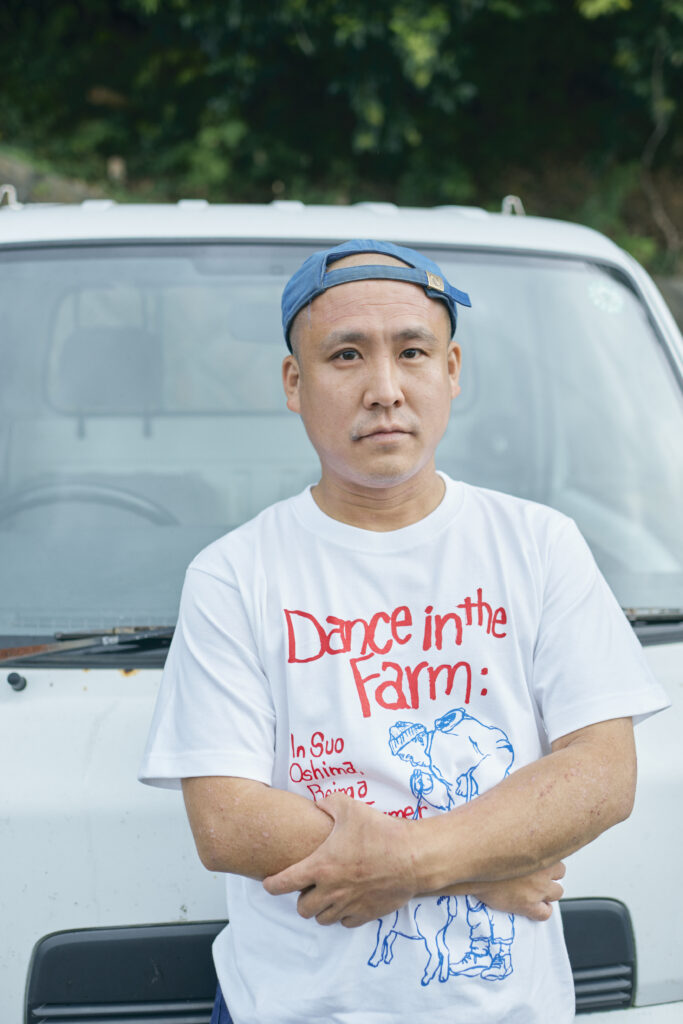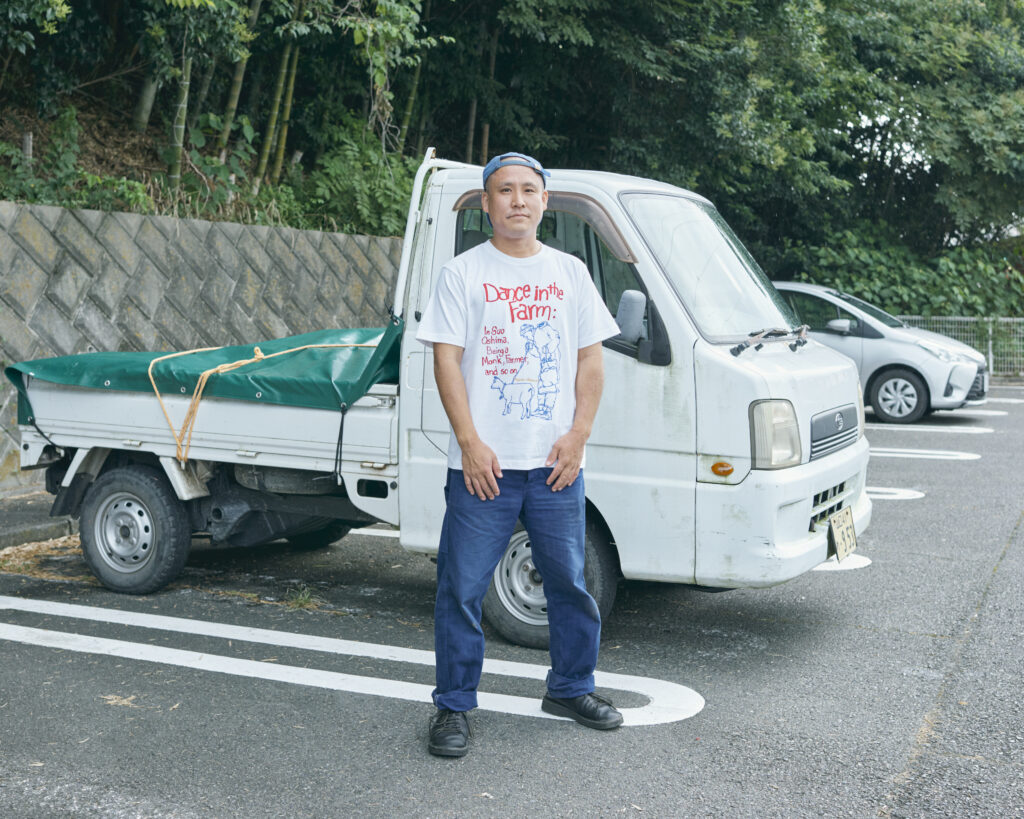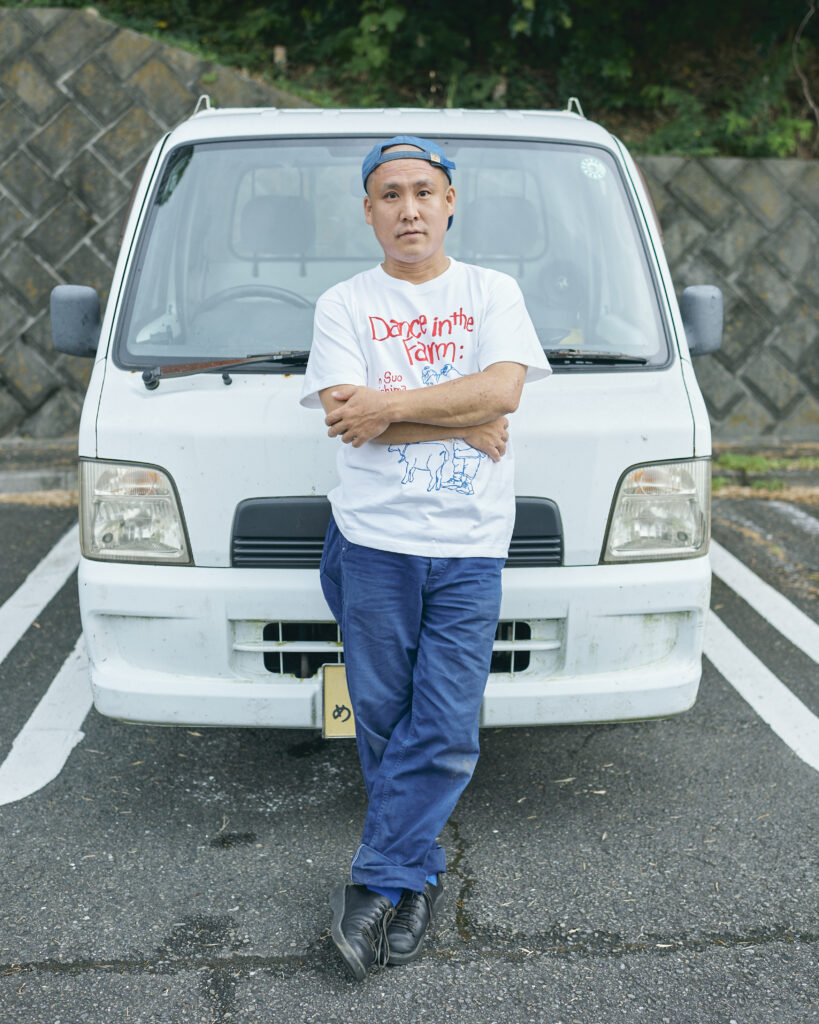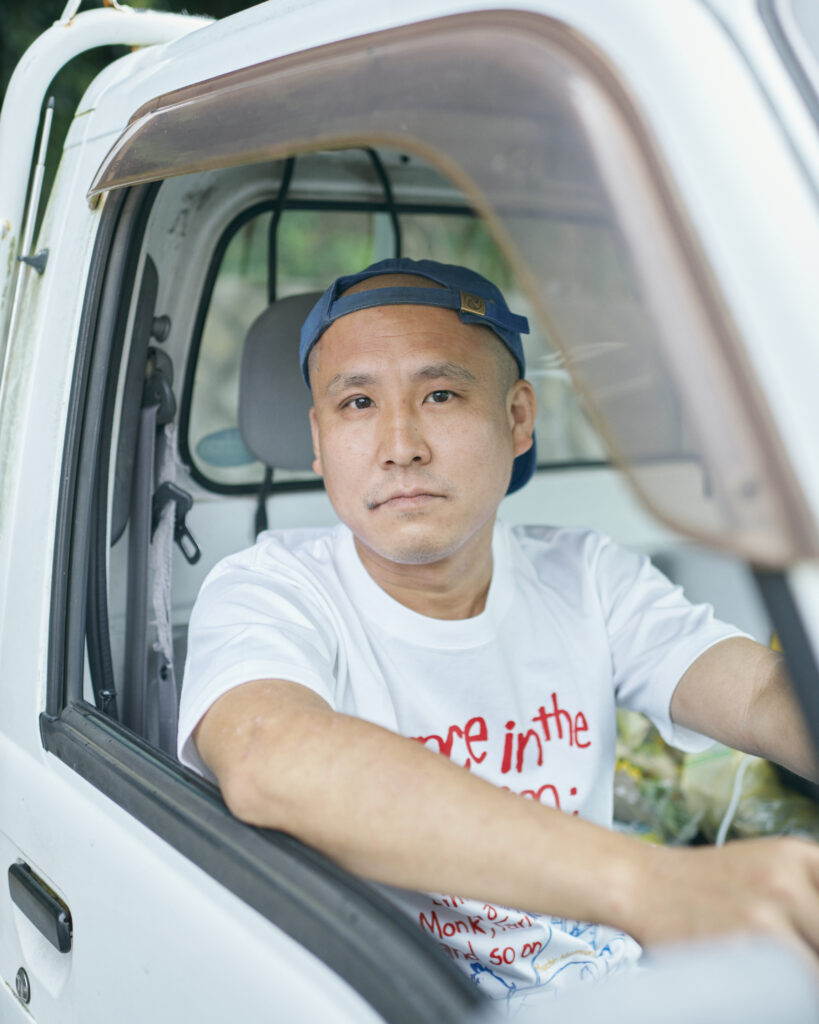It’s been about seven and a half years since the shocking news about the withdrawal of all the members but Kazunobu Mineta from Ging Nang BOYZ in March this year. Former guitarist Chin Nakamura who is now known as Myochin Nakamura published a book “Dance in the Farm Suo-Oshima de bozu to Noka to Hoka Iroiro” (Mishimasha Publishing Co., Ltd.) .
Nakamura appeared at the meeting place in a small truck, wearing a T-shirt with “Dance In The Farm” logo. “When will you be shooting? There is a beautiful rainbow now, so if you would like to do now. ” says Nakamura. Even through these initial words we could get a feeling of his warm personality. In this interview, he talked about everything from his days in the bands, to the work as a farmer and monk, to the life in the island, carefully choosing the words for us.
——It may be a question that you have been asked thousands of times, but what would you answer if you are asked your current title?
Myochin Nakamura (Nakamura): I’m saying I am a “farmer and monk,” but I don’t really know what I really am (laughs). But probably, the easiest answer would be the farmer and monk.
——On Twitter, you have mentioned that one of the themes of your book “Dance in the Farm” was “ to straddle various things”. Can you say more about it?
Nakamura: I’m getting more and more fed up with the act of making clear distinctions among something. I was very much influenced by Tim Kerr * who drew the illustration for the cover of my book, and when I reread his interview, he said something exactly like that. In the biography for his Instagram account, he describes what he is doing as to “Take photos Do art Play music” and to “BREATHE.” This sounds really cool.For the sake of convenience, there are occasions when I need a genre or title, but I echo his idea completely. But it may sound a bit uncool if I say “I’m a genre called me”(laughs). Tim Carr ‘s attitude looks perfectly cool.
* Born in Austin, Texas in 1956. He is a guitarist of the punk band “Big Boys”. He is currently active as a visual artist. He has a high reputation as a painter.
——In an interview conducted around when you just left Ging Nang BOYZ and moved to this region, you said something like, “If I quit the band, I have to go in a completely different direction from what I used to be.” Did you want to get away from music once?
Nakamura: That’s right. The time just before I left the band Ging Nang BOYZ was terrible (laughs). I despaired of all the relationships related to music. There was a series of miserable experiences even though I simply wanted to live as a human being. I couldn’t listen to music at all at the time. It was painful and I knew I wasn’t a craftsman-like musician, so what I chose was not music.
——I think it’s difficult to stop the music that you’ve been playing all the time and newly find an identity or what you can rely on.
Nakamura: I really didn’t have any regrets or hesitation. Anything would have been okay if it wasn’t that band. It may be rude to the listeners, but it was a big problem for me. At that time, I couldn’t put it into words, but now I can say that there are some lines that we must not cross when expressing something. In particular, the band is an expression of collaborative work, so it’s a little different from, for example, one artist creating a work on his/her own. Of course, there is magic that can only be created by a band, and it might be good to stay within an allowable limit, but I think that was not the case with me. Well, the fact that everyone but one has quit tells everything.
What agriculture and music have in common
——As for emigration, your wife first returned to Suo-Oshima, where her parents’ house is, with her children after the Great East Japan Earthquake, right?
Nakamura: Yes, that’s one of the reasons for the migration of wives and children. I also tend to think that it was the cause of the earthquake, but I’m not the one.people tend to think that the earthquake triggered my emigration too, but that’s not the case. For a while, I was the only one in the family working in Tokyo. So, to be honest, since there was a withdrawal from Ging Nang BOYZ, and the next thing and place could just be anything and anywhere but doing a band.
——Did you decide to start farming when you move?
Nakamura: When I lost music as an option and I was like, “What should I do?”, my wife said, “Why don’t you do farming?” And I said “Yeah”.
——Had you had any experience in agriculture before?
Nakamura: No. But when I was a kid, my mother had a home garden, and there was a little bit of childhood experience. Also, I suddenly remembered growing edamame in my apartment in Koenji, where I lived in when I was in the band, and the joy of its harvesting.
——And you started working as a monk at the same time, right?
Nakamura: Two vibes came at the same time. These are kinds of feeling that I should do both. So I went with the flow, and this happened (laughs).
——Was the training hard?
Nakamura: It was physically and mentally difficult. Two out of nine people who trained together quit halfway through.
——I know you were trained in the Shingon sect, but how did you choose it?
Nakamura: I just happened to have a connection with that temple. When I was having a hard time playing the music in Ging Nang BOYZ, I got introduced to that temple by some acquittance. So I and the other member all went there. In that period I got interested in a traditional religion. I think the initial impulses of punk and rock are super cool, but tradition seems to have the opposite approach. There are tons of bands that shine explosively with their first album and then disappear. We don’t feel that kind of flashy explosive power in tradition, but it seems to have the strength to live forever. I might have wanted to know both.
——Although you are monk, you are not always staying in a temple, right?
Nakamura: I don’t have that kind of opportunity so far. It’s similar to my own view on music. “What I do” does not necessarily have to be the same as “what I earn money from”. Having seen older punk rockers doing music while doing other work, I thought it was good to have music that wasn’t about earning money, just striving for coolness. Such is the case with things other than music. I would be satisfied if only I could explore what I like.
——Shinya Abiko, another ex-member of Ging Nang BOYZ, also started farming. What do you think the spirit of punk and farming have in common?
Nakamura: We are often talking about the reason why musicians can make a smooth transition from music to agriculture, but it’s probably because of the fact that punk people think seriously and carefully for every single expression. And I like it. That will make the way the music resonates more enjoyable. If you imagine how serious this musician think for this destructive music, the music sounds more and more attractive. Or the fact that people play such a strange music after much thought would make that music more attractive.
On the contrary, once I realize a musician is doing music just as a business, the magic within works disappears. I met a lot of people in the world of agriculture who were close to the type of people I love. I’ve just realized there are such kind of people in this different world too. They are close to my favorite people in the music industry because they are striving for an answer for every single challenge, which I thought was cool. It’s similar to the feeling when playing music.
——Do you draw on what you have cultivated in music to do farming?
Nakamura: What I learned from music helps me in many situations. For example, I have an online shop. And I started it originally because I wanted to deliver the crops I grew to my acquaintances and other close people. But other producers later suggested dealing with their crops on that site. As a result, I converted this online shop into the one that delivers crops of variety of producers and shows their philosophy and the production process. To me, it feels like I’m borrowing some ideas that were originally in the music industry.
This book is not about “the praise of emigration”
——What did you find particularly good about moving?
Nakamura: As I wrote in the book, it was when I was given a very simple word, “I’m glad that you are here.” I learned that there is such a way of affirmation. It may be the best to have heard that word. It seems like a total affirmation of existence from a disinterested motive.
——Especially in Tokyo, you tend to be judged based on whether you are usable or useless.
Nakamura: That’s true. Even a band would do that judgements too. Therefore, when I was told that someone is happy just because I am here, that made me wanted to put my palms together.
——I may be wrong, but isn’t there a view like “the alien has come”?
Nakamura: I think there is. However, being in the opposite position now, I understand the feeling of being wary and scared when strangers come. And through sharing something with each other and giving something back to each other, we relieve fear and concern. Even in terms of just a greeting, some people may be confused by a more intimate manner or a closer distance than one done in the urban area. So not everyone is suited to it.
But after all, people need to have such a closer manner in the countryside. Considering that people have to help each other in case of trouble, it should be helpful to have a closer relationship. In the urban area, since these things are a service that you pay for, there is a structure in which wealthier people will be more secure in a troublesome situation. But in the countryside there are situations where even if you have money, it is useless. Therefore, if you usually build smooth relationships, you can help each other in case of trouble.
——There was also an episode in which opinions were divided among the residents when the water supply was cut off, but is there any conflict that makes it difficult to express opinions because it will affect future relationships at such times?
Nakamura: Ah, there is. I had a conflict with regard to the dismantling of the old public hall, which I wrote in the book. When the residents had a discussion about the demolition of it, I said, “I think this building is of great value, but what about it?”, but I thought it was little difficult to insist on it strongly, and I should not do it. If you do it, there is a fear of creating a more serious conflict. So at such times you may have to be flexible. But I feel like I have to say something strongly when I’m really in a troublesome situation. Even if you are afraid of disagreements, I believe there is such a situation.
——I thought it would be a good book for those who are considering moving to the countryside, but was that part consciously written?
Nakamura:I didn’t want this book to look like immigration praise.I didn’t want to be like the one saying “I’m having fun here, being out of urban and busy life”. I really don’t want to fuel something like a migration boom or a return-to-agriculture movement. Although I recommend them, I would like to be careful not to support a boom because I don’t like that kind of atmosphere.
——Finally, is there anything you would like to do in the future?
Nakamura: Actually, I am going to take over the public hall that I mentioned earlier without destroying it. Now I’m at the stage of coordinating everything related to it. I have a responsibility to maintain and manage the old public building. Since it needs to be renovated, so I may ask people all over the country for various things.
——You also mentioned that a new public hall was also going be built, right?
Nakamura: Actually, that’s already built. The old one was supposed to be dismantled, but I thought we should not waste it. That is what I want to do from now on.
——How do you plan to use the renovated public hall?
Nakamura: I wish there is a place where people could experience something authentic. Basically, I tend to think that content is more important than infrastructure, but I think we also need infrastructure that has the power to complement that contents. So there is a reason why temples and old buildings remain.
This community center was originally built by the residents at the time because they wanted to do a theatrical play. The ideal relationship for the audiences and the building would be like: this building has become what it is because people want to do this and that with it. So I would like to keep a place where people can experience that kind of experience.
——Don’t you feel like playing music again in the future?
Nakamura: At first, I didn’t have that feeling at all, but gradually I felt like I didn’t have to refuse it obstinately. So now I think I may as well do it. If I play music, since I like bands, I want to do them. I would like do it with someone, not just by myself.

Myochin Nakamura
Myochin Nakamura is a farmer and monk born in Tokyo in 1978. As Chin Nakamura, he worked as guitarist of rock band Ging Nang BOYZ until 2013. After moving to Suo-Oshima, Yamaguchi Prefecture at the end of March 2013, he lives as a monk while working on agriculture at “Nakamura Farm”. He also runs a “Yorimichi bazaar” with his wife, in which he sells agricultural products and organizes live events.
http://www.nakamura-organics.com
Twitter:@radiodregs
Photography Yohei kichiraku
Translation Shinichiro Sato





